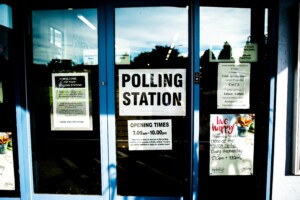The Bristol Referendum 2022: Thinking Through the Options David Sweeting, Robin Hambleton and Thom Oliver

Share this
The co-authors of this article are members of the Bristol Civic Leadership Research Project: David Sweeting, Senior Lecturer in Urban Studies at the School for Policy Studies, University of Bristol; Robin Hambleton, Emeritus Professor of City Leadership at the University of the West of England, Bristol; and Thom Oliver, Associate Lecturer, University of the West of England, Bristol.
The article is part of Bristol Ideas’ Referendum 2022 debate which looks at all aspects of city governance as part of ongoing work on democracy and the forthcoming May 2022 referendum.
In a referendum on 5 May 2022, the citizens of Bristol will make an important decision about the way our city is governed.
Citizens will be asked to choose between retaining the existing mayoral model of governance, which was introduced into Bristol in 2012, or to opt for a committee system of decision-making, which was last used in Bristol in 2000. In a new report, called The Bristol referendum 2022: Thinking through the options, we consider:
- What exactly are these two ways of running a city?
- What are the strengths and weaknesses of these two models?
- How could the models be designed to enable Bristol to respond to the current challenges the city now faces?
This is the latest report from the Bristol Civic Leadership Project (BCLP). This project, which brings together city governance experts from our two local universities, has been examining the impact of mayoral governance on the city since 2012.
Research findings on mayoral governance and the committee system
Our research has shown that the introduction of mayoral governance has had many benefits for Bristol. Opinion research carried out by the BCLP before and after the introduction of a directly elected mayor – in 2012, 2014 and 2018 – indicates that the citizens of Bristol felt that the leadership of the city became far more visible. Civic leaders agreed that the mayoral model enhanced the visibility of the city leader, and they also felt that the mayoral model had improved the leadership of the city.
Detailed investigation over the last ten years has also revealed that civic leaders in the city, in the public, private and community sectors, as well as citizens at large, take the view that Bristol’s first two directly elected mayors, Mayor Ferguson (2012-2016) and Mayor Rees (2016-2024), have both been successful in developing a positive vision for the future of the city and that the mayoral model meant that the city was much better represented in national and international settings.
On the downside BCLP research has also shown that, following the introduction of mayoral governance, many councillors felt that their role in city governance became unnecessarily restricted. There was also concern amongst civic leaders that too much power had become concentrated in the office of the mayor. Our survey research also suggests that citizens’ views on the timeliness of, and trust in, decision-making have not been improved by the introduction of mayoral governance in Bristol.
This new report also reviews experience with the committee system used in Bristol and across local government in Britain up to 2000. Supporters of the committee system argued that it enabled local government to be both effective and democratic, and that it provided councillors with influential roles in decision-making.
However, in a report published by the Bristol Local Democracy Commission in 2001, major criticisms of the committee system were identified. The Commission found that there was no clear and accountable leadership, that important decisions were not subject to proper and effective scrutiny and that a lot of time and effort was absorbed to no great effect in committee meetings.
Where next for city governance in Bristol?
Current legislation means that the referendum will fix the governance system of Bristol for ten years, from 2024 to 2034. It is a hugely significant decision. This new report discusses a range of issues for citizens to consider and here we highlight three important themes.
First, the literature on city leadership suggests that the way city governance is organised can have an important impact, not just on whether a city council is able to be effective in meeting the many complex issues they face, but also on the democratic vitality and inclusiveness of decision-making in their city.
It follows that all the citizens of Bristol should be encouraged to consider which of these two models of governance will help the city respond to the major challenges now facing the city. These challenges include: responding to the public health consequences of the COVID-19 pandemic; revitalising the economy of Bristol in the face of economic downturn; addressing the global climate emergency; and addressing increasing social, economic and racial inequality in our city.
Second, key democratic questions emerge in this debate. What are the advantages and disadvantages of enabling citizens to directly elect the city leader? What are the pros and cons of the committee system, where the council leader is selected by councillors? As part of our research on mayoral governance, we have long argued for stronger roles for councillors within the mayoral system. Adopting a committee system gives councillors clear roles in decision-making. In our report, we consider these and other matters, and include consideration of the ways that the models shape political leadership, their impacts on accountability and the ways that they affect the representation of people locally and the city externally.
Third, given the momentous significance of the May referendum for the future governance of Bristol the report recommends the establishment of an independent Bristol Governance Commission. This new commission, which would need to include representatives from across the voluntary, community, trade union, business, public and university sectors should be charged with the task of considering the best way to improve the governance of the City of Bristol.
This new commission should be set up without delay to take evidence, to consider experiences with successful city governance elsewhere in the world and to make recommendations to Bristol City Council.
The outcome of the Bristol Referendum in May 2022 is best seen not as the end of a debate about city leadership in Bristol, but the beginning of a civic conversation on how to improve the quality of city governance in our city.
The Bristol Referendum 2022 report
Find out more about Bristol Ideas’ Referendum 2022 debate. Copyright of articles remains with the authors.


